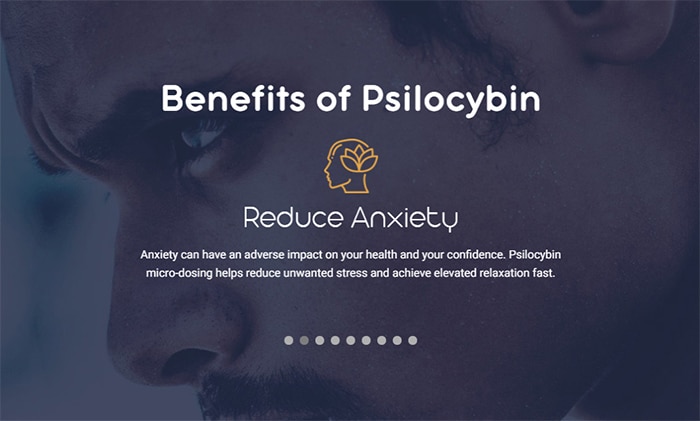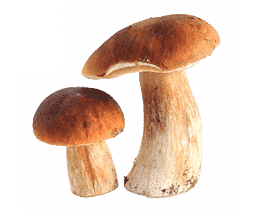Many Americans still associate hallucinogens with the hippie lifestyle of the 1. 60s: drugs. A lifestyle that now gives beneficial psychedelics like shrooms a bad rap.
…This stereotype is seriously outdated.
Today’s clinical trials and studies on psychedelic experimentation prove this.
Accumulated research to date suggests psychedelic drug-assisted psychotherapy may emerge as a potential breakthrough treatment for some mental illnesses. They include depression, anxiety, post-traumatic stress disorder, and addiction.”
Today, we’re talking about an opportunity for many to experience freedom from addiction.
Opportunities that regular everyday people like 65-year-old Carine Chen-McLaughlin took.
Desperate for freedom from her nicotine addiction, she joined an experimental study of psilocybin therapy for smokers.
For Carine, quitting smoking felt like an unattainable feat. Yet even when faced with one chance at freedom from addiction, she still had concerns:
Treatment is basically saying good-bye to a very old friend. And worrying about: Am I going to be OK without this one good friend?’”- npr.org
Just like 49 million other tobacco users in the U.S, Chen-McLaughlin tried everything to quit but nothing worked.
At least not for over one week — but we’ll return to her story later.
What is Addiction in Simple Words?
Addiction is a brain disease characterized by out of control substance use. People with addiction are so preoccupied with drugs that it consumes their life.
Some of the most common addictions are:
Alcohol
Marijuana
Hallucinogens
Inhalants like paint thinners
Opioid pain killers like codeine
Sedatives and hypnotics
Narcotics like heroin
Tobacco
People with drug addiction have a warped sense of reality which seeps into their behavior and bodily functions.
This happens due to changes in their brain wiring, which induces strong cravings for the drug they’re addicted to. It makes it difficult for the inflicted to get freedom from their addiction.
In fact, brain imaging studies show regions with roles in addiction.

Source: ncbi.nlm.nih.gov
The prefrontal cortex is the focal area for cognition and planning.
The ventral tegmental area (VTA) and nucleus accumbens (NAc) are key components of the brain’s reward system.
The VTA, NAc, amygdala, and hippocampus are major components of the limbic system. They coordinate drives, emotions, and memories.
Addiction causes problems at work and with family members — though these people may offer the best support once the addict accepts addiction treatment.
What Happens If You Dont Treat Your Addiction?
Addiction can have profound effects on individuals and their loved ones. Without proper treatment, the consequences of addiction can escalate and negatively impact various aspects of one’s life. This article delves into the potential ramifications of leaving addiction untreated, while also highlighting the promising treatment approach of psilocybin-assisted therapy using magic mushrooms.
Understanding Alcohol Use Disorder – Alcohol use disorder (AUD) is a prevalent form of addiction that can lead to severe physical, psychological, and social consequences. Without effective intervention, Alcohol use disorder can progressively worsen, affecting overall health and well-being.
The Role of Same Brain Receptors – Addiction, regardless of the substance, involves the same brain receptors and pathways. Continued substance abuse reinforces these connections, making it increasingly challenging to break the cycle without proper treatment.
Exploring Psilocybin-Assisted Therapy – Psilocybin-assisted therapy has gained recognition as a promising treatment approach for addiction. Magic mushrooms, containing the psychoactive compound psilocybin, have shown potential in helping individuals break free from the chains of addiction.
Accepted Medical Applications- Psilocybin-assisted therapy is increasingly being recognized by the medical community as a viable option for addiction treatment. Various studies and clinical trials have demonstrated positive outcomes, indicating its acceptance as a medical intervention.
Unveiling the Power of Psychedelic Drugs – Psychedelic drugs, such as magic mushrooms, have unique properties that can induce altered states of consciousness. Under the guidance of trained professionals, these experiences can facilitate introspection, emotional healing, and profound shifts in perception, offering new perspectives for addiction recovery.
The Promise of Magic Mushrooms- Magic mushrooms have shown promise in reducing substance cravings, increasing self-awareness, and promoting emotional and psychological healing. The psychedelic experience, coupled with therapy, allows individuals to confront underlying issues contributing to their addiction.
Embracing a Promising Treatment – Psilocybin-assisted therapy is gaining traction as a promising treatment for addiction. Integrating the use of magic mushrooms within a therapeutic framework can provide individuals with the support and tools they need to address the root causes of their addiction and embark on a transformative journey toward recovery.
Categories of Symptoms for Substance Use Disorder
The four main categories are:
Impaired control — A strong desire for the drug and/or failed attempts to cut down consumption.
Social problems — Difficulty completing major work/school tasks, chores, and engaging in social activities.
Risky use — Persistent use of the substance in risky settings like work where there are clear and dire consequences.
Drug effects — Tolerance (they need higher doses to get the same effect).
Addiction also affects mental health. People with addiction tend to have one or more co-occurring mental illnesses like depression.
The addiction may either aggravate pre-existing mental conditions, or the conditions may drive people to drugs as a form of treatment. This works as momentary freedom rather than recovery from their debilitating symptoms.
For the majority of my life, I’ve struggled with anxiety and depression. I have been to more doctors than I care to share. Mind Mend has changed my life. They’ve given me back my freedom.” – Judith Marie
Which Hormone Is Responsible for Addiction?
sciencenewsforstudents.org
Some people still believe freedom from addiction is about willpower. Hopefully, the right information on the hormones involved will change that.
Dopamine
Whenever you do anything that feels pleasurable, your body releases dopamine. By pleasure, we’re talking about food, sex, and drugs.
Drugs like cocaine cause a massive release of dopamine that’s impossible to achieve without the drugs.
Below are two steps showing addiction, as users’ brains become heavily reliant on drugs for these unnatural sensations — trading their freedom for dependency:
ncbi.nlm.nih.gov
PET: Cocaine causes dopamine buildup in the synapse
In this illustration based on PET studies, cocaine blocks the dopamine transporter, preventing it from pulling dopamine back into the sending cell.
Serotonin
Serotonin is responsible for pleasurable feelings. Yet it plays a unique role in addiction.
Drugs like marijuana and other hallucinogens produce excessive amounts of serotonin. Users share it makes them calm and peaceful.
Despite this, repetitive use reduces the body’s natural response to serotonin, especially during treatment for depression.
Adrenaline and Norepinephrine
Adrenaline initiates the famous fight-or-flight response.
It does this through:
Blood vessel constriction
Elevated heart rate
Quickened breathing
Norepinephrine is like serotonin in that it:
Elevates mood
Regulates energy levels
Helps with alertness
“Adrenaline junkies” get addicted to the rush from high-risk behaviors like bungee jumping so they’re more at risk of drug addiction.
After the body is deprived of substances it depended on, it changes. It relies on higher levels of adrenaline and norepinephrine for the fight-or-flight response.
This explains why many addicts quit rehab before completing their treatment.
Cortisol
When you think of stress, you think of cortisol. Its main role in the body is to:
Increase blood glucose levels
Repress the immune system
Regulate metabolism of food
Recent research reveals that high levels of cortisol may lead to alcohol addiction.
Attempts to withdraw from alcohol result in higher cortisol levels, and this discomfort hinders addiction treatment.
Yes, addiction can tax on your physical and mental health. Especially when you have little support and information on your recovery journey.
…But we’re here to help you get freedom from addiction by taking shrooms.
I wish I’d known about this product sooner. Years of suffering gone boom! I was new and very scared of taking shrooms, but I’ll never look back. Truly godsend treatment and freedom.” – April
unsplash.com by Tony Sebastian
What Does Freedom From Addiction Look Like?
unsplash.com by Pablo Heimplatz
Remember the bold Carine Chen-McLaughlin who sought freedom from addiction?
As a patient in the study, she’d ingest only one dose of psilocybin in a private session that included Cognitive Behavioral Therapy (CBT).
She stayed committed to recovery and followed her treatment plan.
With help from CBT and support from her family, psilocybin completely changed her life.
…you never start a sentence with an ellipsis some initial challenges during treatment.
The psilocybin session would last six hours or so. As the shrooms kicked in, she was directed to close her eyes, go inward, and embrace whatever shows up.
I lay for hours on the couch as the psilocybin unleashed a host of fears. My fears took the form of swirling dark clouds I believed were trying to suffocate me. And that was super scary.”
Yet a vision of her then-recently deceased mother carried her through that experience. Somehow she could feel her spiritual presence dissipating the dark clouds.
That marked the point of freedom for her life. Because as the dark clouds disappeared, so did her desire to smoke.
Let this be a reminder:
You are not alone as you go through the highs and lows of treatment and recovery
“I haven’t smoked since March 23, 2018. I finally have freedom but I have no clear idea why it worked.”
Psilocybin has been the ultimate game-changer for Carine’s addiction treatment. Not only has she quit smoking but she’s also physically repulsed by cigarettes. Talk about freedom!
One day I was feeling stressed, so I asked my husband for a puff of his cigarette. But when I reached for it, I couldn’t even touch it. You could pay me $5,000 and I couldn’t do it. I know it sounds really weird, but that’s what happened: Something in my brain sort of got switched. I guess this is what freedom from addiction looks and feels like.”
Who would have ever thought freedom from addiction to be possible?
We did. We still do. We see it every day through the customers we help.
I am living proof that mushrooms can help people with addiction issues.” – Carl Ray
So, What’s Next?

A smoother treatment and recovery process awaits you.
How Mind Mend Help Can Help You Battle Your Addiction
Overcoming addiction can be a challenging journey, but with the right support and innovative approaches, it is possible to reclaim your life. By delving into the realm of psychedelic medicine and specifically psilocybin treatment, we uncover a promising path towards healing and recovery.
The Rise of Psychedelic Treatment – Psychedelic treatment is gaining recognition as a breakthrough approach in addressing addiction and other mental health conditions. By utilizing substances like psilocybin, a naturally occurring psychedelic compound, this form of therapy offers a unique and potentially transformative experience for individuals seeking recovery.
Understanding Psychedelic Medicine – Psychedelic medicine refers to the therapeutic application of substances like psilocybin, LSD, or MDMA to facilitate healing and personal growth. These substances have shown remarkable potential in guiding individuals through profound introspection, emotional processing, and breaking free from the cycle of addiction.
The Power of Psilocybin Treatment – Psilocybin treatment involves the controlled and supervised use of psilocybin, commonly found in magic mushrooms. This psychedelic compound has shown promise in reducing cravings, enhancing emotional well-being, and fostering a sense of connectedness and insight, all of which can be instrumental in battling addiction.
Ready to take the next step towards battling addiction and reclaiming your life? Explore the wide variety of magic mushrooms offered by Mind Mend, including capsules, gummies, and teas. Experience the transformative power of these natural remedies and embark on your journey towards healing and recovery. Order At Mind Mend today and discover the path to a brighter, addiction-free future.





